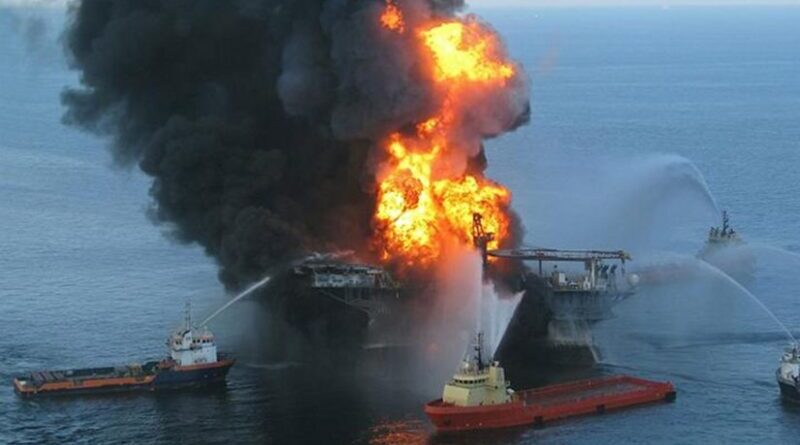Deepwater Horizon Disaster’s Controversial Legacy – OpEd
By Arab News
By Andrew Hammond*
This week marks the 10th anniversary of the start of the landmark Deepwater Horizon disaster, which saw millions of gallons of crude oil leak into the Gulf of Mexico. The massive spill easily exceeded that of the 1989 Exxon Valdez debacle — the previous worst US oil catastrophe — and resulted in the deaths of 11 people, affected large stretches of US coastline, and killed or harmed many thousands of birds, sea turtles and marine mammals such as dolphins.
The disaster received massive global attention, and the subsequent regulatory and political backlash was, in some respects, a watershed moment for the industry. Soon afterwards, for example, several countries, including the US, Canada and Norway, declared moratoriums on deepwater drilling.
A decade on, significant concerns continue to be voiced about the safety of deepwater drilling, while the political legacy of Deepwater Horizon remains intensely controversial.
This month, for instance, the US National Wildlife Federation released a report asserting that the Gulf still hasn’t fully recovered from the environmental disaster. Take the example of dolphins — it is estimated it will take decades for local populations to fully recover, as they struggle with issues like worsened lung disease, abnormal stress responses, anemia, and weight loss.
Some evidence from other major spills also indicates there can be a long-term legacy on local ecosystems. Last year, for instance, marked the 30th anniversary of the Exxon Valdez disaster, which saw millions of gallons of oil spilled in Alaska, where a number of species have reportedly still not recovered.
In this context, voices of discontent continue to be raised about the safety of oil drilling, with significant spills occurring on a relatively regular basis. But it is on deepwater drilling where the worries of most environmentalists are particularly focused. Last June, several such groups sued the Trump administration for what they asserted were decisions to weaken the critical safety rules created after Deepwater Horizon.
Part of the reason so much concern remains specifically focused on deepwater drilling locations is that, over the last decade, a significant portion of new international hydrocarbon reserves have been discovered in these areas. Critics assert that, despite ongoing reviews to safety measures, and better technology, the prospect of future disasters remains significant, in part due to the remoteness and depth of some locations and the resulting challenges posed by the recovery of oil.
While scientific and technological innovation can enable greater safety in the future, “risk-free” drilling is unrealistic. Moreover, modern technology can be a double-edged sword for oil companies. This was emphasized in a 2014 report by reinsurance broker Willis Group, which asserted that too much of the energy sector at that time had no insurance against major cyberattacks and that could threaten “a major energy catastrophe on the same scale as… Exxon Valdez or Deepwater Horizon.” As the report noted, modern technology allows oil and gas networks to be operated remotely. However, this provides scope for hackers and /or computer viruses to potentially target the electronic infrastructure, meaning oil pipelines or refineries could be placed at risk.
According to the Willis Group study, the US Department for Homeland Security asserted that more than 40 percent of attacks on America’s critical national infrastructure, in the year to September 2012, targeted energy firms. It claimed that this situation represented a “time bomb” and that energy companies needed to enhance their cyber defenses.
Despite these conventional and unconventional challenges, the post-2010 appetite of major oil firms to operate in deepwater areas has remained strong. Firstly, despite the risks, these locations are proving a rewarding frontier for oil exploration. And governments are generally permitting firms to operate in deepwater locations. In the Gulf of Mexico, for instance, the US government awarded the first new post-disaster deepwater drilling permit in March 2011, less than a year after the spill began.
Another key reason why offshore drilling may continue apace is the resilience of leading oil firms to wide-ranging international risks. The scale and profitability of these giants, despite fluctuations in oil prices, typically equips them to respond quickly to new opportunities, as well as withstand major setbacks, and this will continue — especially if energy demand picks up robustly after the coronavirus crisis subsides.
Thus, despite a reported $60 billion in costs from Deepwater Horizon, BP remains a key oil major. And this is despite the initial blunders, including by former CEO Tony Hayward, in managing the 2010 crisis, which saw its share price almost halve at one point.
While the legacy of Deepwater Horizon therefore remains controversial, deepwater drilling could well — in the absence of any further major industry debacles in the near future — remain a key part of the global political and economic landscape for years to come.
- Andrew Hammond is an Associate at LSE IDEAS at the London School of Economics.

